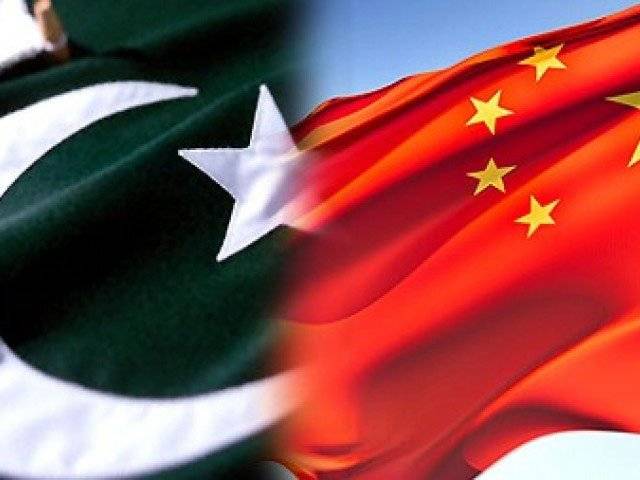BEIJING - The Afghanistan problem cannot be resolved until two important states in the region the Peoples Republic of China and the Islamic Republic of Pakistan join hands and make concerted efforts towards the objective. China is not developing seaports in Pakistan, Sri Lanka and some other countries for any military purposes, therefore no conspiracy be attached to it. These were the views expressed by a top-ranking official of the Chinese Foreign Office in an exclusive briefing held here Tuesday for the visiting media delegation from Pakistan on a goodwill mission as part of the 60th anniversary celebrations of the foundation of Sino-Pakistan relations in 1950. The Chinese official said: Rain or shine, Sino-Pak relations would stand all testing times like in the past. He said Beijing firmly believed that despite all odds some progress had been made towards Afghan solution and the prevailing situation was not at all discouraging. Security situation is still in shambles and incidents of suicide bombings and sporadic terrorist activities are continuing, the official however added. He was of the view that the world community should respect Afghan sovereignty and also realise that people in the war-torn Muslim country have been suffering for well over four decades now. The Afghans have the right to rule and it is the fundamental responsibility of the world community to extend full support to them, and China on its part would provide the required support and assistance towards this goal, the official said. To a question from this correspondent, the official said terrorism anywhere in the world had its own domestic and international reasons. He said his country was against all forms of terrorist activities and added that Islamabad and Beijing had joined hands to eliminate this menace and both were cooperating with the world community in all possible manners. However, he made it clear that the stakeholders should not try to direct their efforts to single out any one religion and shift the blame on it. There was a dire need to address the root causes, failing which the trouble would continue indefinitely, the official remarked. On building seaports in the South Asian region, the official said the fundamental objective was to create shorter routes for sending Chinese goods to other destinations in the world. By no means should anyone interpret that they are being built for military purposes or against any country. China does not believe in zero-sum cooperation, instead it has been its consistent policy to create a win-win environment for all, he said. On the Kashmir conflict, the senior official said it was an issue left over by the history and there was a dire need that both India and Pakistan resolve it by holding bilateral dialogue. He said China had always supported Pakistans Kashmir cause and would continue to do so in future as well. On the Indian premier and his army generals allegation that Chinese troops are present in Pakistan and some part of Azad Kashmir, the official said Beijing had, in categorical terms, denied this false accusation. He expressed surprise as to why the Indian media was cooking up such baseless stories. He said China sent some groups after the 2010 flash floods to assist in rehabilitation efforts and China has made it clear to the Indian authorities. He said India is an important state of the region and Beijing was keen to improve its relations with New Delhi through diplomatic means. He said China was a peaceful country and would never seek hegemony over any other state. Asked if China had changed its policy on issuing visas to the people from Indian-occupied Kashmir following Indian Prime Minister Manmohan Singhs visit to Beijing, the official said there was no change at all. We formulate our policies very carefully and keep all ground realities in mind. He said China appreciated the initiative taken by Prime Minister Yousaf Raza Gilani to visit Mohali to witness the semifinal cricket match between India and Pakistan. Such efforts help in confidence building and paved the way to resolve vital issues.
Wednesday, November 20, 2024
Pak-China joint bid only solution to Afghan imbroglio

Court adjourns 190m pound corruption case against PTI founder, Bushra Bibi
6:13 PM | November 20, 2024
PPP demands PAC chairmanship as leadership deadlock persists
5:47 PM | November 20, 2024
MDCAT 2024 retake scheduled for December 8 in Sindh
4:57 PM | November 20, 2024
Marriyum Aurangzeb urges PTI to hold protests in Khyber Pakhtunkhwa
4:53 PM | November 20, 2024
World Health Organization approves 2nd mpox vaccine from Japan
3:49 PM | November 20, 2024
-
Hunger crisis to increase in South Sudan, warns UN
-
Hunger crisis to increase in South Sudan, warns UN
-
Pakistan’s judiciary champions climate justice at COP29 in Baku
-
Punjab struggles with persistent smog as Met Office forecast rainfall
-
Punjab residents face escalating smog crisis as pollution levels soar across country
-
Qatar says Hamas 'no longer welcome' in Gulf state
Digital Stagnation
November 20, 2024
Xi’s Red Lines
November 20, 2024
Last Call
November 20, 2024
Sindh & Indus
November 19, 2024
Another US Escalation
November 19, 2024
Tackle Corruption Within School Boards
November 20, 2024
To Be Opportunistic
November 20, 2024
Democratic Backsliding
November 20, 2024
Empowering Tharparkar through Skills Development
November 20, 2024
Why Not Use AI to Address Climate Change?
November 19, 2024
ePaper - Nawaiwaqt
Nawaiwaqt Group | Copyright © 2024





